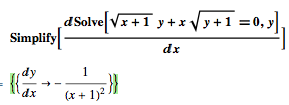Perhaps not the most optimal method, but you could:
- Take the total derivative with respect to x
- Solve for y'[x]
- Solve the given equation for y
- Substitute (3) in (2)
Simplify, assuming bounds for x given
Simplify[
Solve[Dt[x \[Sqrt](1 + y) + y \[Sqrt](1 + x), x] == 0,
Dt[y, x]] /.
y -> Solve[x \[Sqrt](1 + y) + y \[Sqrt](1 + x) == 0, y][[1, 1, 2]],
Assumptions -> {x >= -1, x <= 1}][[1, 1, 2]]
output:
-(1/(1 + x)^2)
Edit: @Nasser gives the "more optimal" method I suggested in the beginning. I do too much solving and differentiating.
Instead of Differentiating, Solving, Solving, Substituting, and Simplifying (5 steps); why not just Substitute, Solve, Differentiate, and Simplify (4 steps) (Nasser's improvement)? Alternatively (my slight improvement), just Solve, Differentiate, and Simplify (3 steps):
Dt[Solve[x √(1 + y) + y √(1 + x) == 0, y],
x] // Simplify
Out:
{{Dt[y, x] -> -(1/(1 + x)^2)}}
Easier to look at version:

It turns out that including the bounds on x are redundant! However, if you wish to include them (again, unnecessary):
Simplify[Dt[Solve[Sqrt[x + 1] y + x Sqrt[y + 1] == 0, y], {x}],
Assumptions -> {x >= -1 && x <= 1}]


